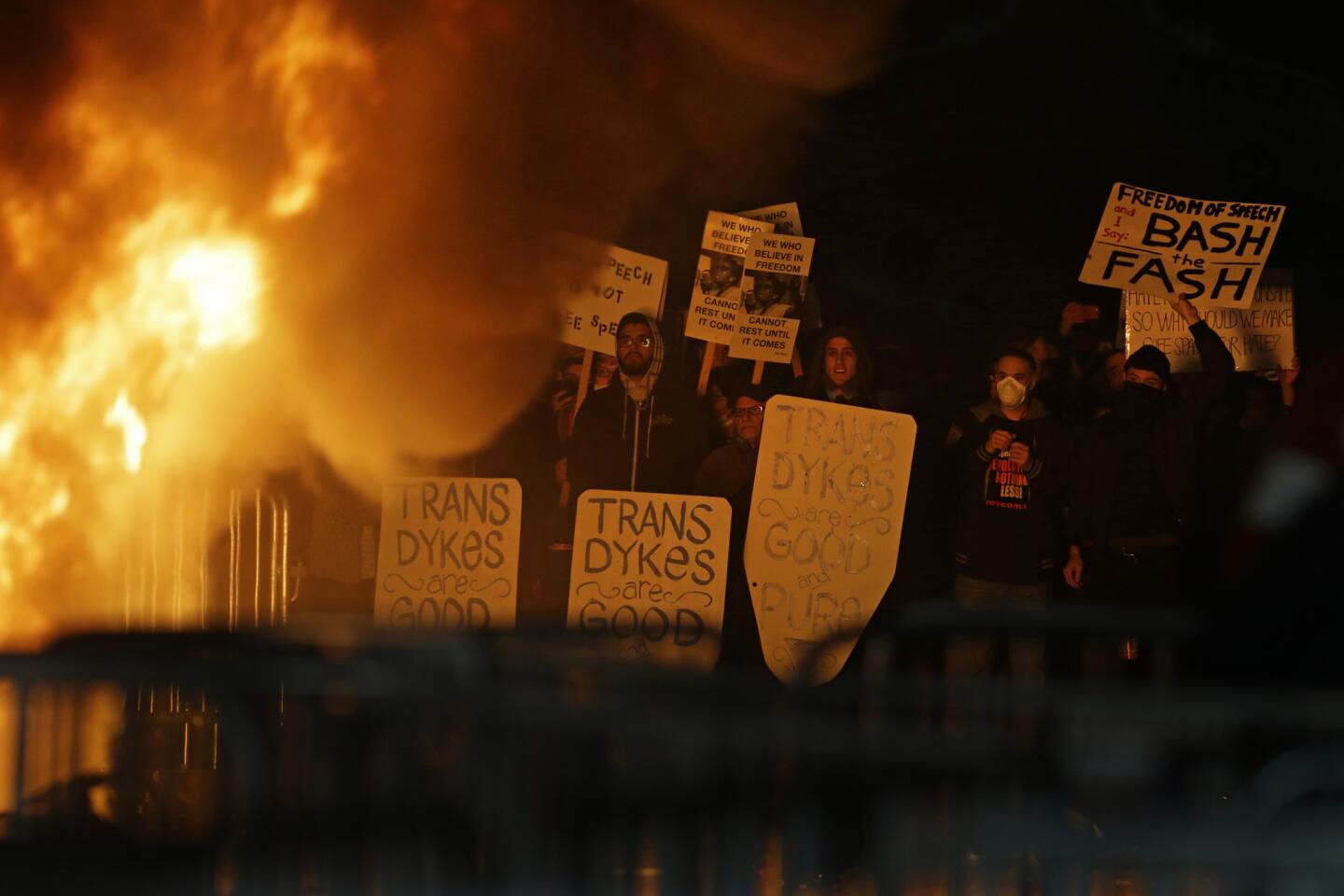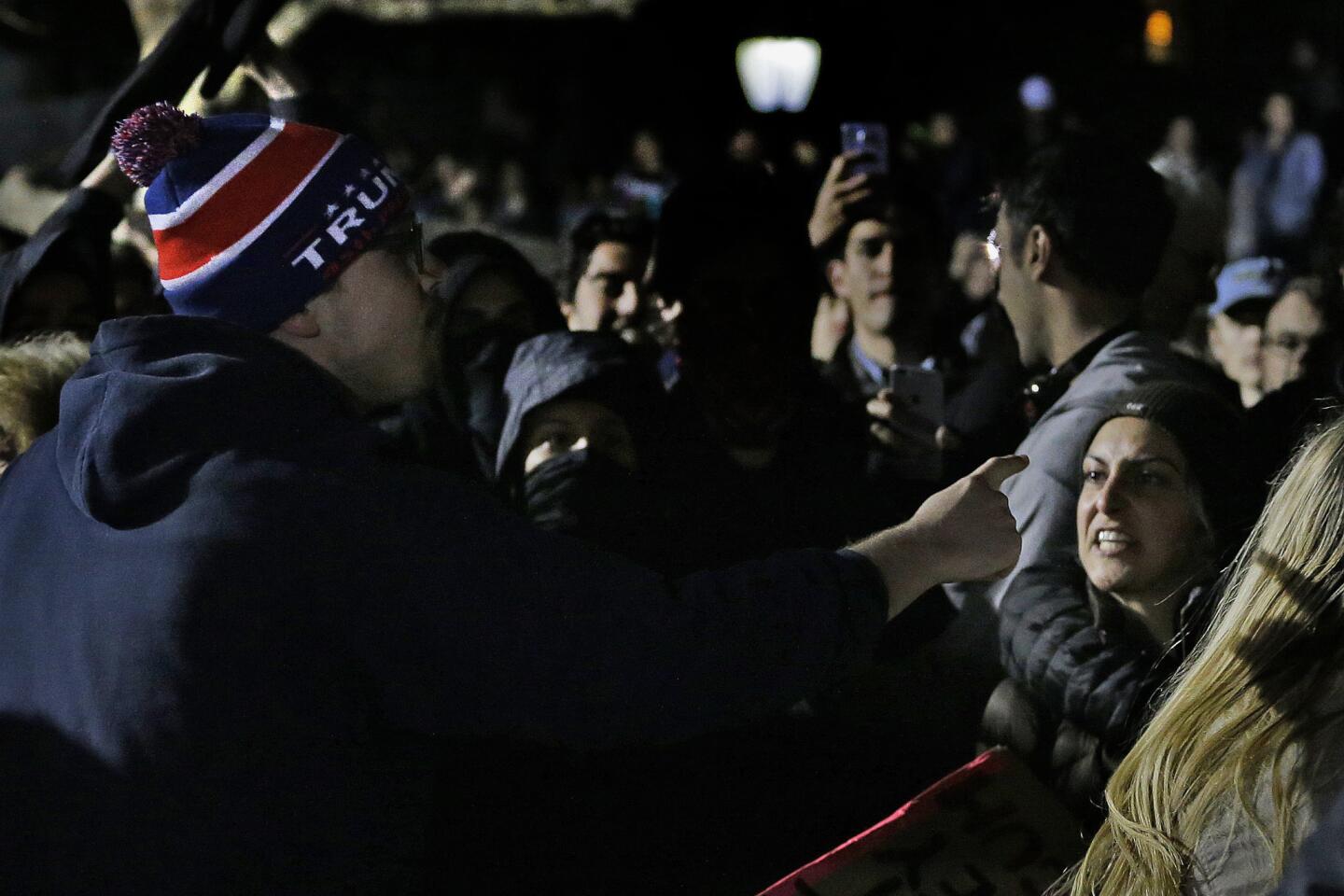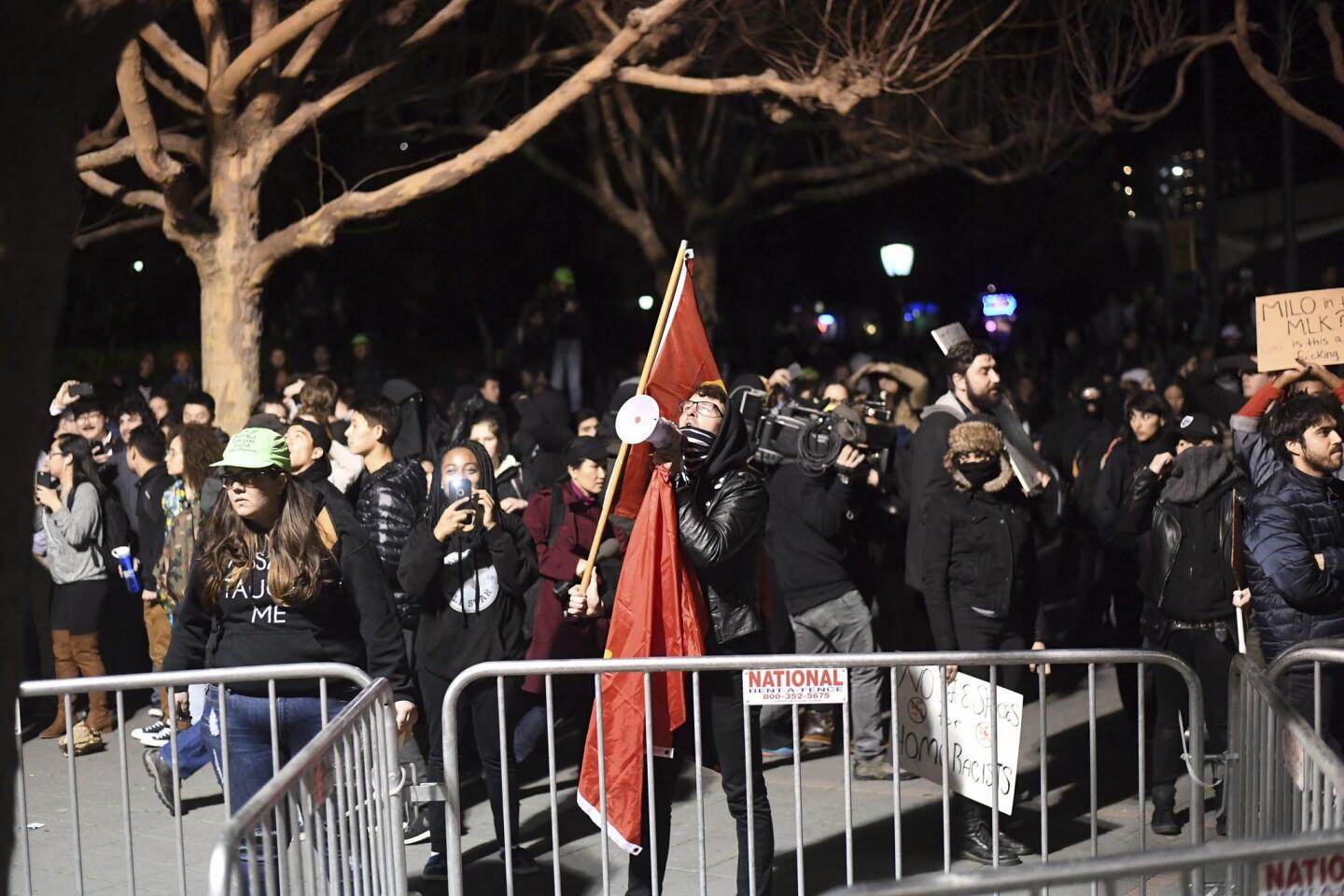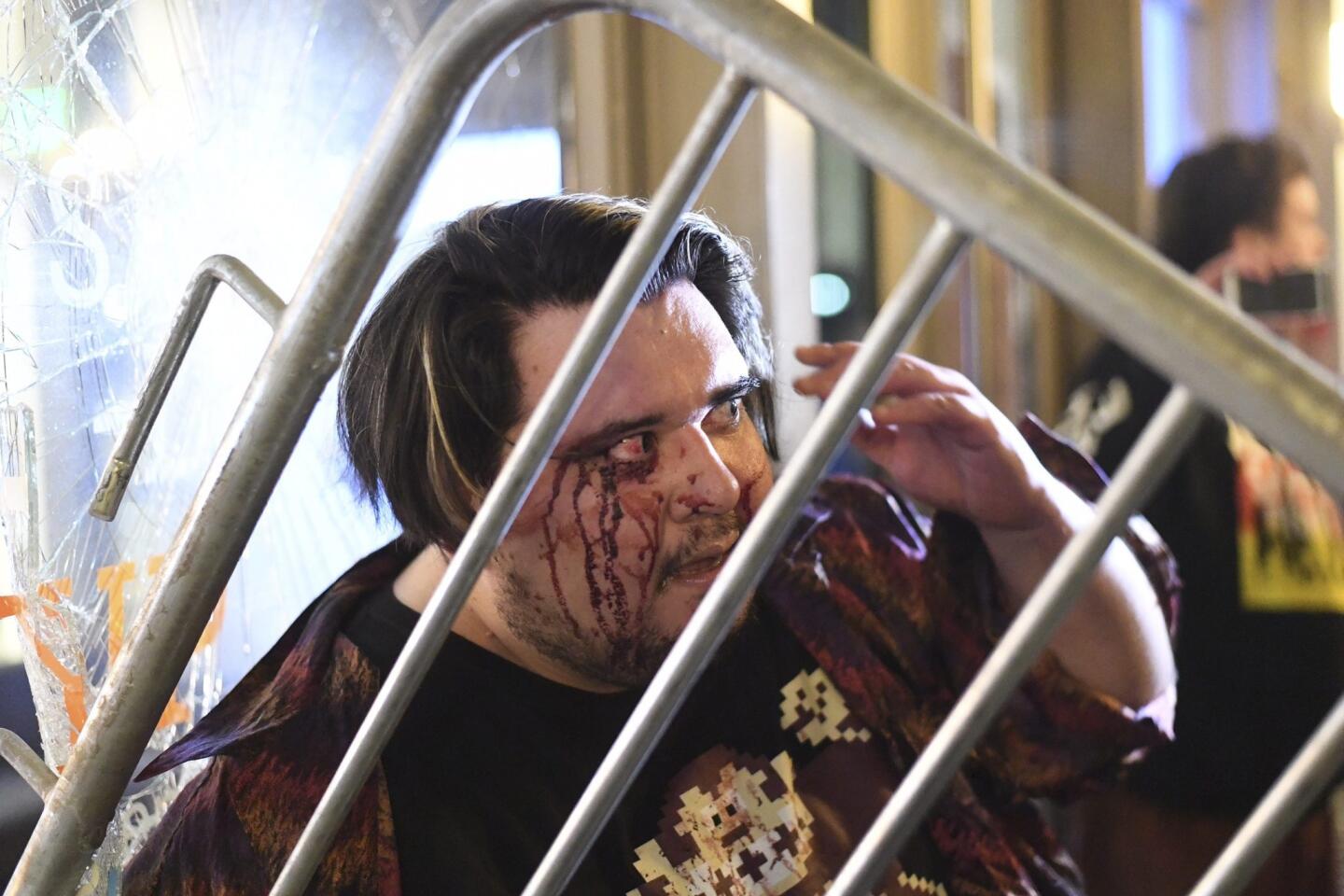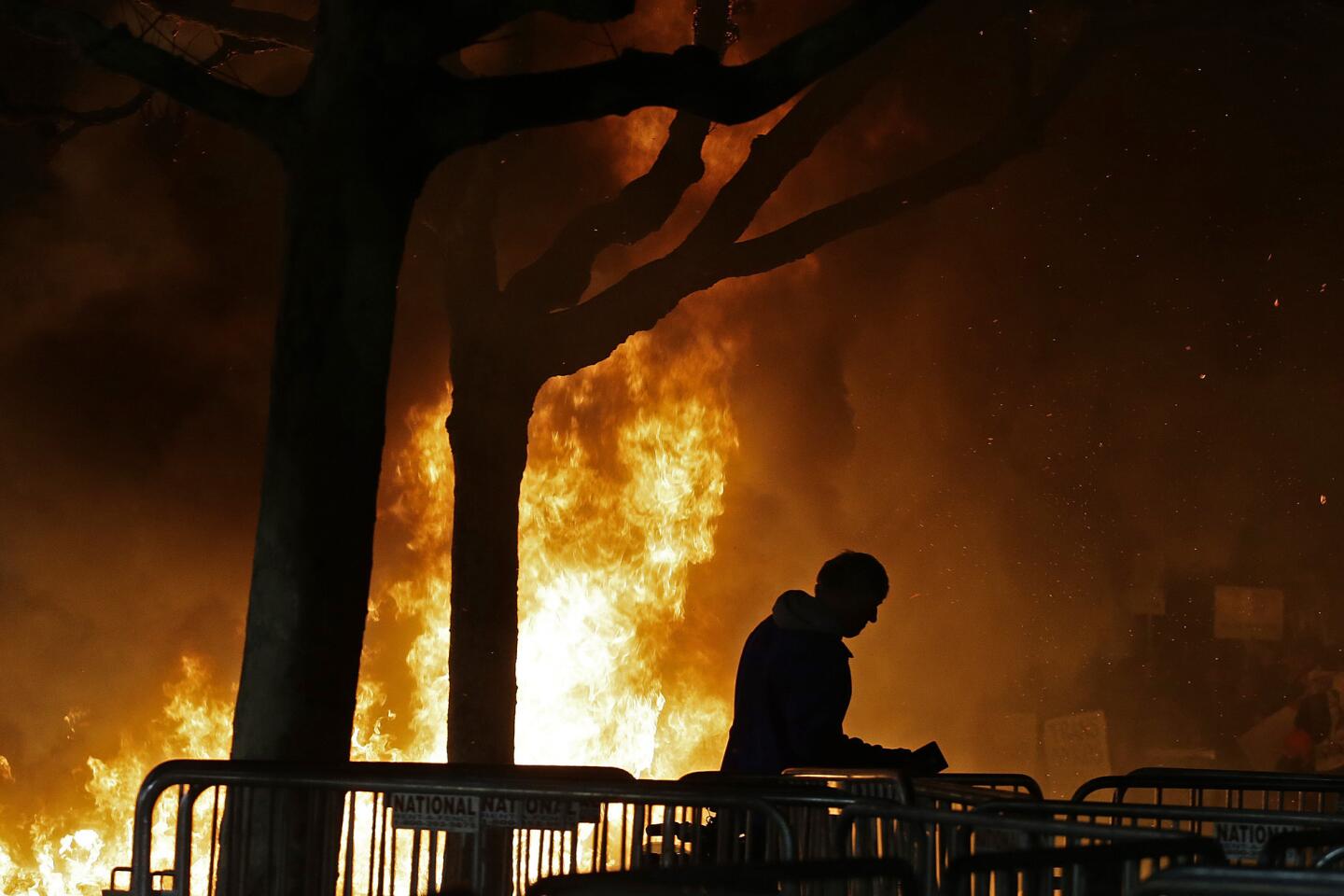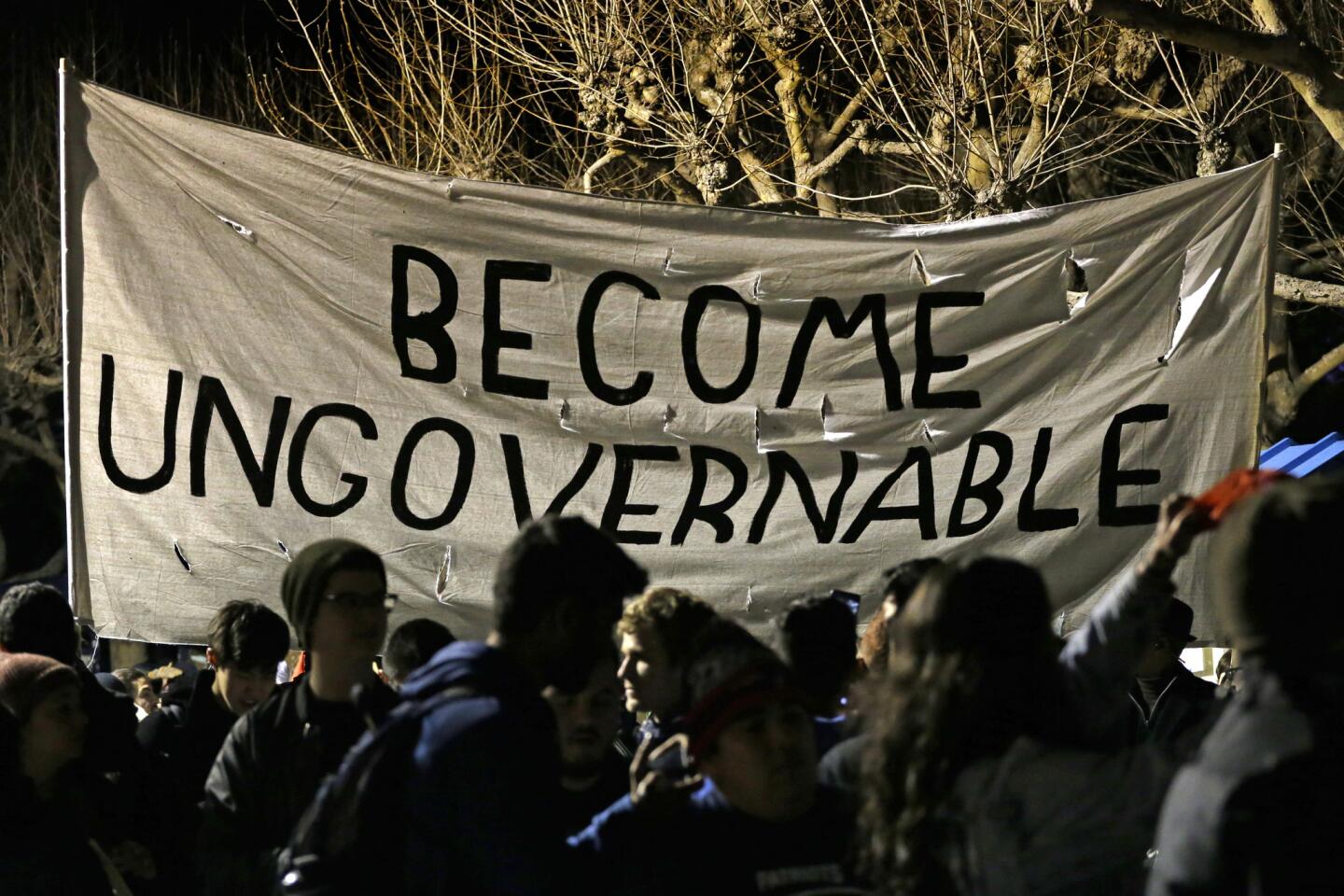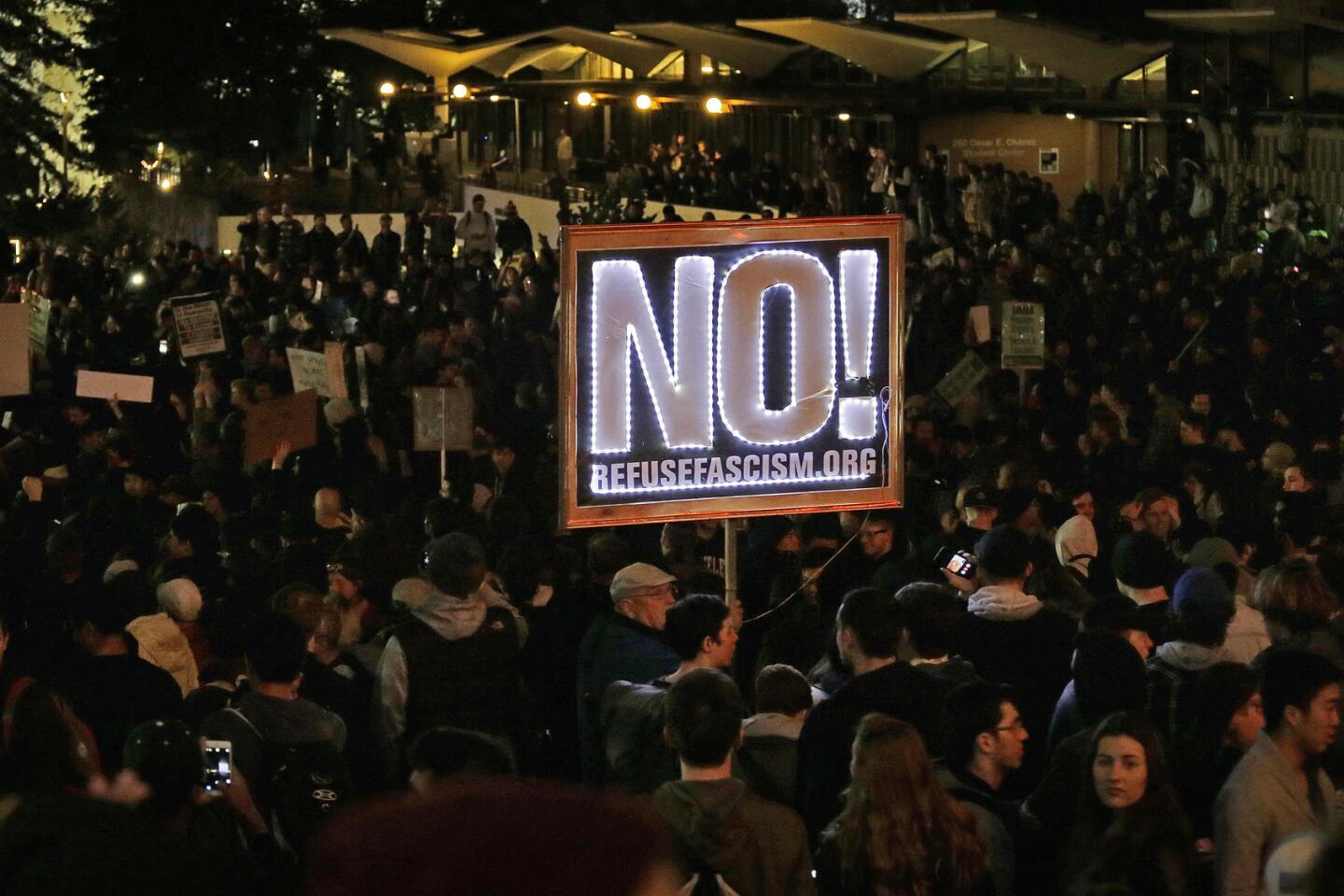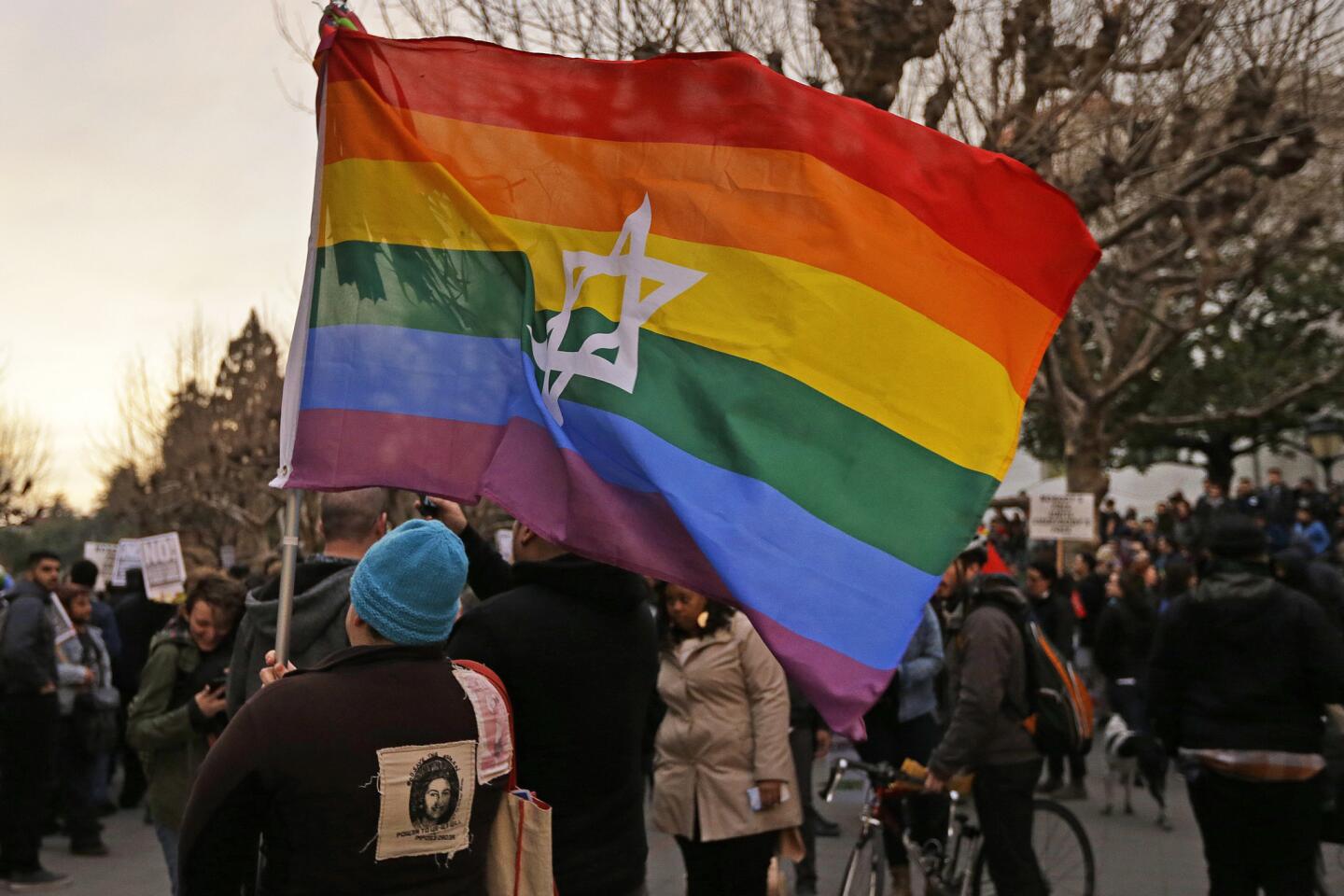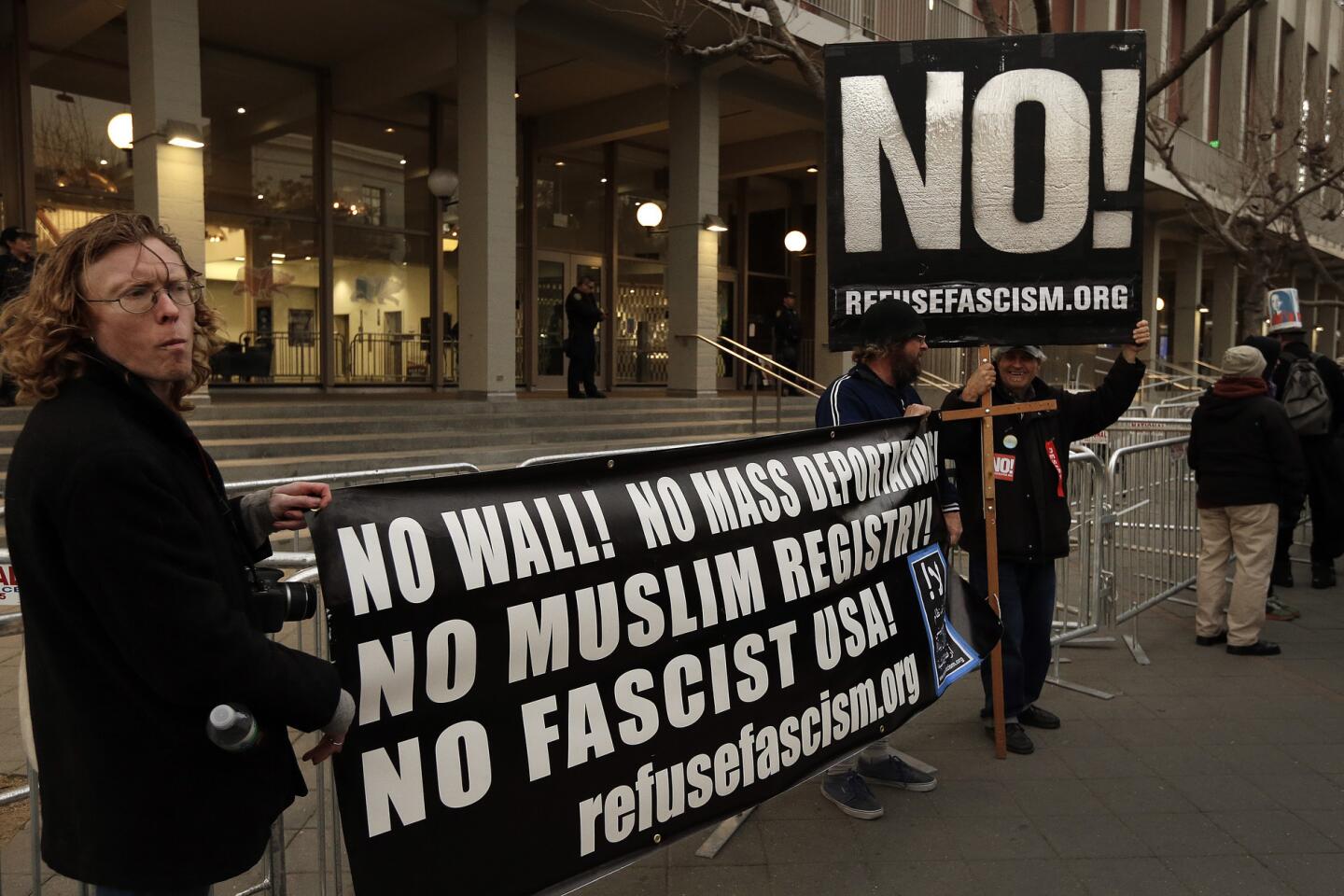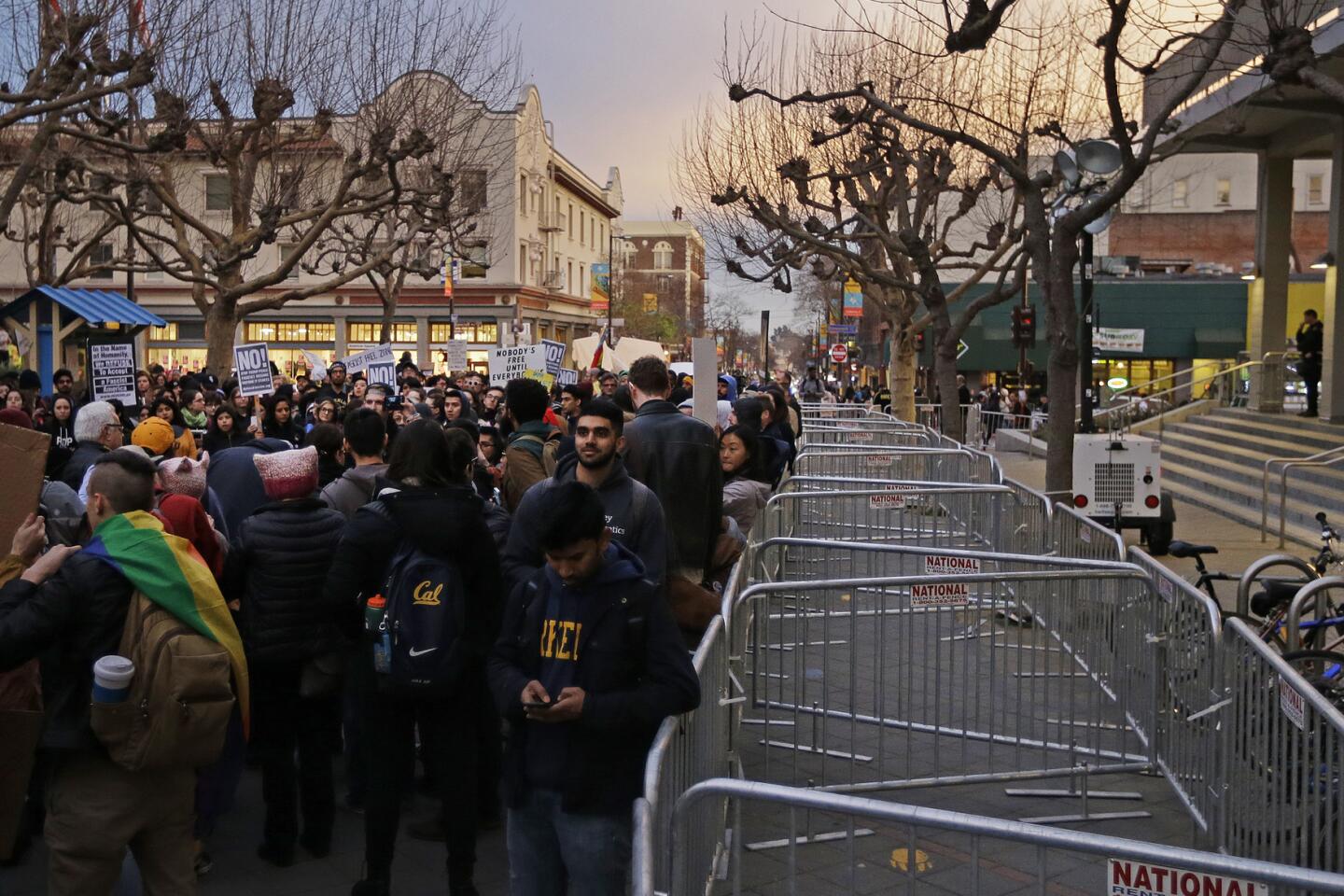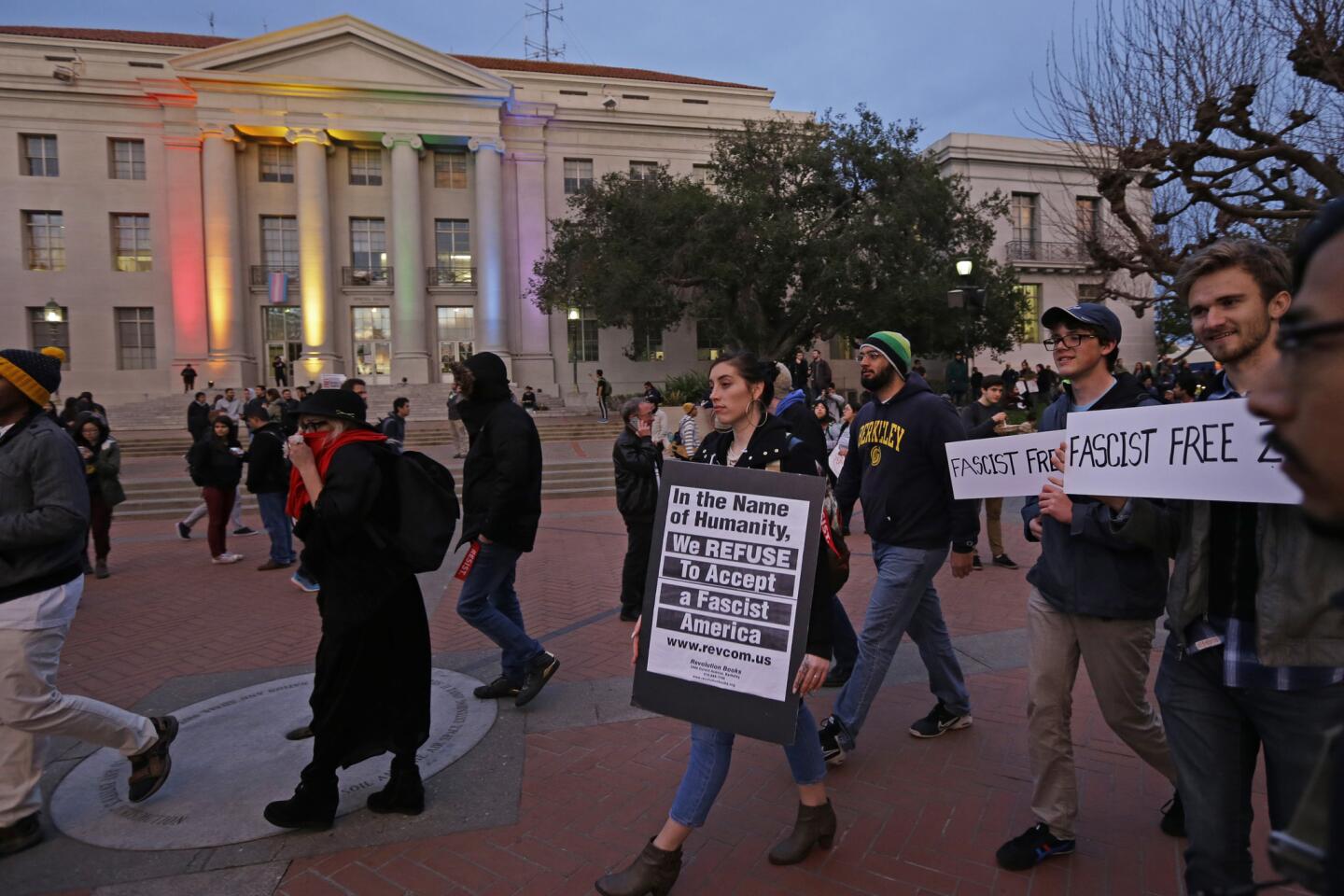UC Berkeley — home of the free speech movement — finds itself under fire from left, right and Trump

A speech by conservative firebrand and Milo Yiannopoulos was canceled at UC Berkeley on Wednesday amid violent protests that prompted President Trump to suggest cutting funding to the university.
- Share via
UC Berkeley was just mopping up after what appeared to be a small group of violent protesters from off campus shut down the speech of conservative provocateur Milo Yiannopoulos — an appearance that university leaders had staunchly defended despite hundreds of requests to ban him.
Then came the tweet from President Trump, which in an instant both blurred the facts and exacerbated the tension.
“If U.C. Berkeley does not allow free speech and practices violence on innocent people with a different point of view — NO FEDERAL FUNDS?” Trump tweeted early Thursday.
On Thursday, university officials, who had worked hard to make room for free speech, found themselves squeezed between outrage on both the right and the left. Also further inflamed was the already roiling UC debate about campus free speech — not just as it concerned Yiannopolous but also a host of hot-button issues, including anti-Semitism, Palestinian rights, sexual harassment and racism.
Scores of supporters, including many academics and California lawmakers, jumped in Thursday to defend the actions of Berkeley — home of the free speech movement five decades ago — and assert that Trump had no power to cut off federal funds.
“Berkeley did everything right,” said Terry Hartle, senior vice president of the American Council on Education, which represents 1,600 universities and colleges.
Berkeley Chancellor Nicholas Dirks resisted demands even from his own faculty members to ban Yiannopoulos’ appearance. Staff members spent weeks planning extensive security arrangements — bringing in dozens of police officers from nine UC campuses — and helping the Berkeley College Republicans obtain the technical equipment their event required.
In a statement Thursday, the College Republicans condemned the “criminals and thugs” for violating their free speech rights — saying, “It is tragic that the birthplace of the free speech movement is also its final resting place.” But they also thanked campus officials for supporting them and protecting public safety.
Dirks also condemned the violence, which he blamed on armed individuals clad in black who used paramilitary tactics to shut down the event. They threw commercial-grade fireworks at police, hurled barricades through windows and started one fire.
“The violence last night was an attack on the fundamental values of the university, which stands for and helps to maintain and nurture open inquiry and an inclusive civil society, the bedrock of a genuinely democratic nation,” Dirks said.
UC officials did not directly comment on Trump’s tweet about federal funding, but concern about funding under the president already had come up at the Board of Regents meeting last November.
UC receives nearly $9 billion in federal funding for education, research and healthcare — a significant chunk of the system’s $25-billion budget. Federal funds are UC’s single largest source of research dollars, amounting to more than $3 billion.
Both the National Science Foundation and the National Institutes of Health declined to comment on Trump’s tweet about a possible cut in funding.
Stuart Russell, a computer scientist at UC Berkeley and founding director of the Center for Human-Compatible AI, argued that Trump was unfairly targeting the campus since outsiders may have committed the violence. He said Berkeley’s federally funded research was critically important to U.S. industries and national defense.
“For Trump to threaten … our funding in a completely extrajudicial and extralegal way [because of things] that he doesn’t like, seems like the act of a dictator,” he said.
Aaron Parsons, an astrophysicist at UC Berkeley, said Trump’s Twitter threat was not being taken too seriously around the campus.
“People have expressed a little bit of mild concern, but the consensus is this is probably bluster like what we have seen many times coming from the president,” Parsons said.
“There are a lot of layers of bureaucracy about what work gets funded, and it’s often decided by a committee of your peers,” he said. “To reach all the way into the bowels of institutions that are supporting science would be an incredible level of micromanagement and there would be very little legal standing for doing so.”
The consensus is this is probably bluster like what we have seen many times coming from the president.
— Aaron Parsons, UC Berkeley astrophysicist
Erwin Chemerinsky, a 1st Amendment expert and the dean of UC Irvine School of Law, said Congress sets conditions for federal funding, not the president, and any attempts to use federal money to coerce local and state governments into desired actions would run afoul of the 10th Amendment.
“The president has no authority to cut off funds, nor should he be making these kinds of threats he has no authority to do,” Chemerinsky said.
Hartle, of the American Council on Education, said that federal agencies may cut off funding to universities in ways prescribed by law — failing to enforce Title IX’s ban on sex discrimination, for instance, defrauding students or cheating in federal research grants. But no law allows funds to be slashed for allegations of free speech violations.
Bill Foster, a congressman from Illinois who worked as a physicist before going into politics, said Trump’s threat to cut federal funds to Berkeley was completely out of line.
“We spent hundreds of years developing the rule of law in this country,” he said. “If everyone is afraid of a strongman, it will set our political culture back centuries.”
The UC Police Department has launched an investigation into Wednesday’s violence, which campus officials said was instigated by about 150 masked individuals hurling Molotov cocktails, setting fires, throwing fireworks at police, pushing barricades into windows, and damaging campus and city property.
Police Chief Margo Bennett blamed the trouble last night on so-called Black Bloc anarchists — so called for their black attire — who marched on to campus in military fashion, brandishing clubs, high-grade fireworks, baseball bats and homemade shields. They are well known in the Bay Area, where they often show up at protests.
Sgt. Sabrina Reich, UCPD public information officer, said campus police made one arrest last night of a non-student, on a charge of failing to disperse. She said police are reviewing video to try to identify suspects, but no one has yet filed a police report about being assaulted or injured.
An early estimate of damage is around $100,000, according to campus officials, and includes fixing broken windows at the MLK Student Union, replacing a generator that caught fire and was destroyed, sand-blasting paint off the concrete steps of the student union, cleaning up graffiti and possibly replacing some pavers and trees on Sproul Plaza. One tree on the plaza was badly singed by flames.
The city of Berkeley’s Downtown Business Assn. is reporting damage to more than 10 businesses including several banks, a Starbucks, a TargetExpress and both a Sprint and a T-Mobile store.
On the Internet, very different story lines continued to spread throughout the day — one of liberal rigidity blocking free speech, another of outsiders unconnected to Berkeley smearing the university’s reputation.
Meanwhile, the Berkeley campus was back to normal Thursday except for crews covering a half dozen Student Union windows with plywood.
Jonathan Sayeh, a college Republican, said he was disappointed that he didn’t get a chance to hear what Yiannopoulos had to say. Dialogue, he said, is better.
“That’s how democracy functions. I express something. You express something. That’s how we compromise.”
Times staff writer Amina Khan contributed to this report.
teresa.watanabe@latimes.com | @teresawatanabe
peter.king@latimes.com | @peterhking
deborah.netburn@latimes.com | @deborahnetburn
ALSO
Opinion: Berkeley protesters just fell into the most obvious trap imaginable. Again
Uber CEO Travis Kalanick quits Trump’s advisory council
UPDATES:
5:50 p.m.: This story has been updated to include an additional comment from a UC Berkeley computer scientist.
This article was originally published at 4:05 p.m.
More to Read
Sign up for Essential California
The most important California stories and recommendations in your inbox every morning.
You may occasionally receive promotional content from the Los Angeles Times.
